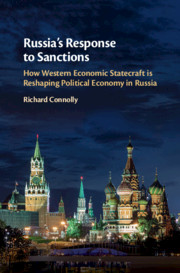 Russia's Response to Sanctions
Russia's Response to Sanctions Book contents
- Russia’s Response to Sanctions
- Russia’s Response to Sanctions
- Copyright page
- Dedication
- Contents
- Figures
- Tables
- Acknowledgments
- Introduction
- 1 Sanctions and Political Economy
- 2 Russia’s System of Political Economy
- 3 Western Sanctions and the Russian Response
- 4 Sanctions and the Energy Industry
- 5 Sanctions and the Defense Industry
- 6 Sanctions and the Financial System
- Conclusion
- Bibliography
- Index
Conclusion
Published online by Cambridge University Press: 25 June 2018
- Russia’s Response to Sanctions
- Russia’s Response to Sanctions
- Copyright page
- Dedication
- Contents
- Figures
- Tables
- Acknowledgments
- Introduction
- 1 Sanctions and Political Economy
- 2 Russia’s System of Political Economy
- 3 Western Sanctions and the Russian Response
- 4 Sanctions and the Energy Industry
- 5 Sanctions and the Defense Industry
- 6 Sanctions and the Financial System
- Conclusion
- Bibliography
- Index
Summary
- Type
- Chapter
- Information
- Russia's Response to SanctionsHow Western Economic Statecraft is Reshaping Political Economy in Russia, pp. 191 - 200Publisher: Cambridge University PressPrint publication year: 2018


